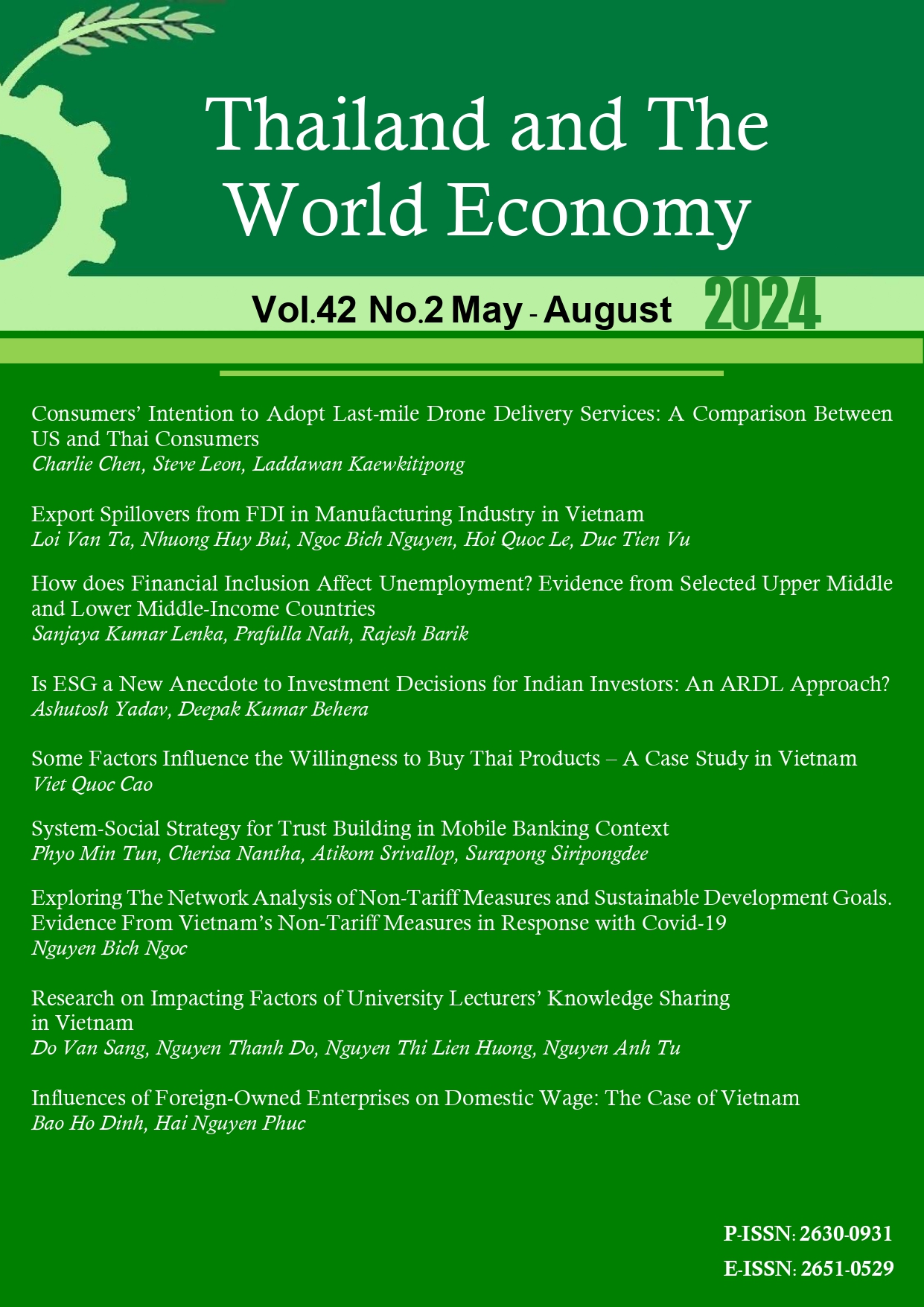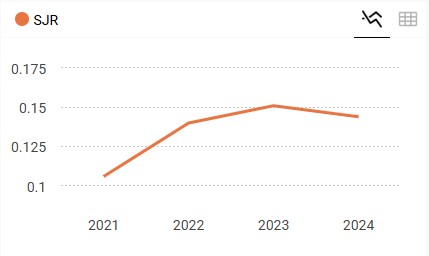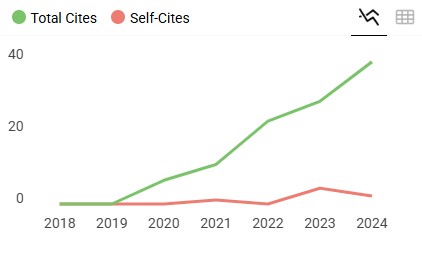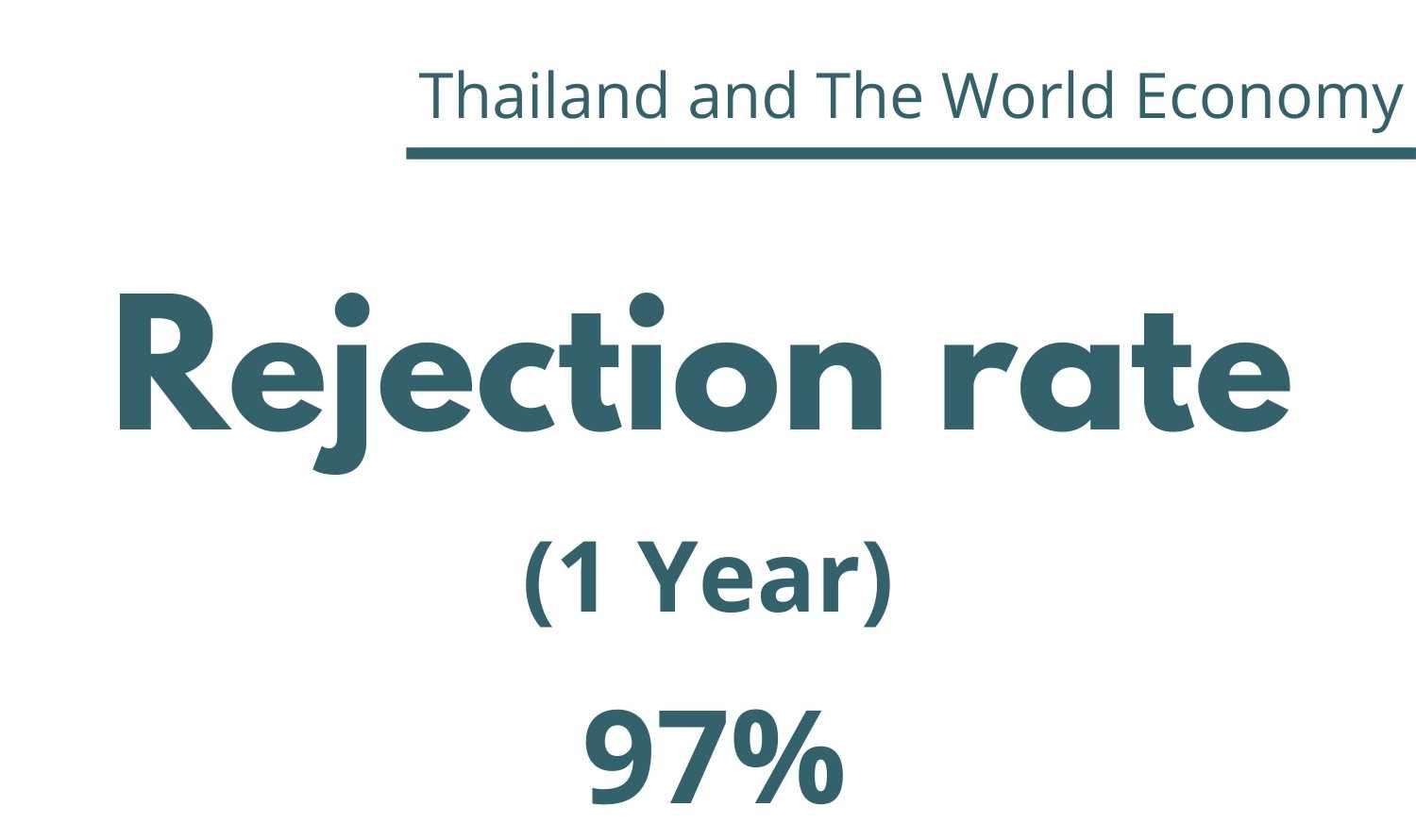System-Social Strategy for Trust Building in Mobile Banking Context
Keywords:
system, social, trust, mobile bankingAbstract
This paper aims to examine the roles of system and social perspectives for trust building in the mobile banking context and the moderating effects of demographic groups on direct effects on trust. The study investigates system perspectives (system quality and system usefulness), social perspectives (social influence and word-of-mouth), and moderators (gender, age, and education) as an exploratory study. This study employed deductive reasoning quantitative research approach by using 294 datasets. Exploratory factor analysis (EFA) and confirmatory factor analysis (CFA) were used to calculate the factors' validity and reliability. The Structural Equation Modeling (SEM) technique was employed to estimate direct effects, indirect effects, and moderator effects. The findings reveal that system quality, system usefulness, and word-of-mouth affect trust, while social influence has an insignificant effect on trust. Besides, system quality has a significant effect on system usefulness, and social influence has a significant effect on word-of-mouth, respectively. Also, education level is significantly moderating the direct effect of word-of-mouth and trust. This research extends the understanding of the system and social perspectives that influence trust and might be a barrier to mobile banking adoption in Myanmar. Also, the findings of this research will assist private banks in recognizing the behavior patterns of customers so that they can create a proper system-social strategy to boost the confidence of customers about mobile banking and fulfill the knowledge gap regarding system and social aspects.
References
Appelbaum, S. H. (1997). Socio-technical systems theory: An intervention strategy for organizational development. Management Decision, 35(6), 452-463.
Arndt, J. (1967). Role of product-related conversations in the diffusion of a new product. Journal of Marketing Research, 4(3), 291-295.
Bagozzi, R. P. (2007). The legacy of the technology acceptance model and a proposal for a paradigm shift. Journal of the Association for Information Systems, 8(4), 244-254.
Baxter, G., & Sommerville, I. (2011). Socio-technical systems: From design methods to systems engineering. Interacting with Computers, 23(1), 4-17.
Chemingui, H., & Lallouna , H. B. (2013). Resistance, motivations, trust and intention to use mobile financial services. International Journal of Bank Marketing, 31(7), 574-592.
Ciborra, C., Migliarese, P., & Romano, P. (1984). A methodological inquiry of organizational noise in sociotechnical systems. Human Relations, 37(8), 565-588.
Damabi, M., Firoozbakht, M., & Ahmadyan, A. (2018). A model for customers satisfaction and trust for mobile banking using DeLone and McLean model of information systems success. Journal of Soft Computing and Decision Support Systems, 5(3), 21-28.
Davis, F. (1989). Perceived usefulness, perceived ease of use, and user acceptance of information technology. MIS Quarterly, 13(3), 318-340.
Dellarocas, C. (2003). The digitization of word of mouth: Promise and challenges of online feedback mechanisms. Management Science, 49(10), 1407-1424.
Delone, W., & McLean, E. (1992). Information systems success: The quest for the dependent variable. Journal of Management Information Systems, 3(4), 60-95.
Filho, E. J., Nogueira, A. C., & Costa, E. M. (2022). Social influence effect on consumers’ intention to adopt mobile banking services. Information Systems Management, 39(3), 269-285.
Fornell, C., & Larcker, D. F. (1981). Evaluating structural equation models with unobservable variables and measurement error. Journal of Marketing Research, 18(1), 39-50.
Ghobakhloo, M., & Fathi, M. (2019). Modeling the success of application-based mobile banking. Economies, 7(4), 1-21.
Hair, J., Black, W., Babin, B., & Anderson, R. (2010). Multivariate data analysis (7th ed.). Upper Saddle River, NJ: Prentice-Hall.
Jhantasana, C. (2022). Composite analysis of mobile banking usage: Dimension and construct effect. Asia Social Issues, 15(5), 252257.
Junglas, A., Goel, L., Abraham, C., & Ives, B. (2013). The social component of information systems-how sociability contributes to technology acceptance. Journal of the Association for Information Systems, 14(10), 585-616.
Kemp, S. (2022, February 15). Digital 2022: Myanmar. Retrieved from Datareportal: https://datareportal.com/reports/digital-2022-myanmar
Khasawneh, M. H., Hujran, O., & Abdrabbo, T. (2018). A quantitative examination of the factors that influence users' perceptions of trust towards using mobile banking services. International Journal of Internet Marketing and Advertising, 12(2), 181-207.
Kline, R. B. (2011). Principles and practice of structural equation modeling (3rd ed.). New York: NY: The Guilford Press.
Koo, C., Wati, Y., & Chung, N. (2013). A study of mobile and internet banking service: Applying for IS success model. Asia Pacific Journal of Information Systems, 23(1), 65-86.
Lee, K. C., & Chung, N. (2009). Understanding factors affecting trust in and satisfaction with mobile banking in Korea: A modified DeLone and McLean's model perspective. Interacting with Computers, 21(5-6), 385-392.
Lonkani, R., Changchit, C., Klaus, T., & Sampet, J. (2020). A comparative study of trust in mobile banking: An analysis of U.S. and Thai customers. Journal of Global Information Management, 28(4), 95-119.
Malaquias, R. F., & Hwang, Y. (2016a). Trust in mobile banking under conditions of information asymmetry: Empirical evidence from Brazil. Information Development, 32(5), 1600-1612.
Malaquias, R. F., & Hwang, Y. (2016b). An empirical study on trust in mobile banking: A developing country perspective. Computers in Human Behavior, 54(1), 453-461.
Maroofi, F., Kahrarian, F., & Dehghani, M. (2013). An investigation of initial trust in mobile banking. International Journal of Academic Research in Business and Social Sciences, 3(9), 394-403.
Mehrad, D., & Mohammadi, S. (2017). Word of mouth impact on the adoption of mobile banking in Iran. Telematics and Informatics, 34(7), 1351-1363.
Montazemi, A. R., & Saremi, H. Q. (2015). Factors affecting adoption of online banking: A meta-analytic structural equation modeling study. Information & Management, 52(2), 210-226.
Mukerjee, K. (2018). The impact of brand experience, service quality and perceived value on word of mouth of retail bank customers: Investigating the mediating effect of loyalty. Journal of Financial Services Marketing, 23(4), 12-24.
Neuman, W. L. (2006). Social research methods: Qualitative and quantitative approaches (6th ed.). Boston, Sage: Allyn and Bacon.
Ramli, Y., Harwani, Y., Soelton, M., Hariani, S., Usman, F., & Rohman, F. (2021). The implication of trust that influences customers’ intention to use mobile banking. Journal of Asian Finance, Economics and Business, 8(1), 353-361.
Ramos, F. L., Ferreira, J. B., Freitas, A. S., & Rodrigues, J. W. (2018). The effect of trust in the intention to use m-banking. Brazilian Business Review, 15(2), 175-191.
Rogers, E. (1995). Diffusion of innovations (4th ed.). New York: the Free Press.
Seddon, P. (1997). A respecification and extension of the DeLone and McLean Model of IS success. Journal of Information Systems Research, 8(3), 215-317.
Singh, N., Sinha, N., & Liébana-Cabanillas, F. J. (2020). Determining factors in the adoption and recommendation of mobile wallet services in India: Analysis of the effect of innovativeness, stress to use and social influence. International Journal of Information Management, 50(February 2020), 191-205.
Tertia, S., & Nurbasari, A. (2022). Perceived ease of utilization, usefulness, security, and trust in mobile banking. Economics and Business Quarterly Reviews, 5(2), 76-82.
Thanabordeekij, P., Sudtasan, T., & Tanamee, D. (2020). Integrating trust into the technology acceptance model: The case of mobile banking adoption in Myanmar. Panyapiwat Journal, 12(3), 107-119.
Tsai, C.-H., Kuo, C.-C., & Tan, M. J. (2017). The cause and effects of word of mouth from consumer intention and behavior perspectives: A SEM model approach. Journal of Economic and Social Thought, 4(2), 212-231.
Tun, P. M. (2020a). Factors influencing intention to reuse mobile banking services for the private banking sector in Myanmar. ASEAN Journal of Management & Innovation, 7(1), 63-78.
Tun, P. M. (2020b). Building a theoretical research model for trust development: The case of mobile financial services in Myanmar. The South East Asian Journal of Management, 14(2), 175-195.
Tun, P. M. (2021a). Essential factors for developing private bank trust in Myanmar. Thailand and The World Economy, 39(3), 31-56.
Tun, P. M. (2021b). Prerequisites and perceived information system qualities model for mobile banking adoption among the customers of private commercial banks in Myanmar. Journal of ASEAN Studies, 9(1), 49-71.
Tun, P. M. (2021c). The effects of service quality and positive recommendation on trust building in mobile banking adoption among the customers of private banks in Myanmar. Journal of Accounting and Strategic Finance, 4(2), 152-171.
Tun, P. M. (2022). A theoretical model for strengthening bank reputation in Myanmar during crisis. Asia Social Issues, 15(5), 1-19.
Venkatesh, V., Morris, M. G., Davis, G. B., & Davis, F. D. (2003). User acceptance of information technology: Toward a unified view. Management Information Systems Quarterly, 27(3), 425-478.
Win, S., & Kofinas, A. (2021). A historical institutionalist perspective on the persistence of state controls during financial sector reforms: The insightful case of Myanmar. Journal of Accounting in Emerging Economies, 11(1), 94-121.
Zhou, T. (2011). An empirical examination of initial trust in mobile banking. Internet Research, 21(5), 527-540.
Zhou, T. (2012). Understanding users' initial trust in mobile banking: An elaboration likelihood perspective. Computers in Human Behavior, 28(4), 1518-1525.
Downloads
Published
How to Cite
Issue
Section
License
Copyright (c) 2024 Thailand and The World Economy

This work is licensed under a Creative Commons Attribution-NonCommercial-NoDerivatives 4.0 International License.










